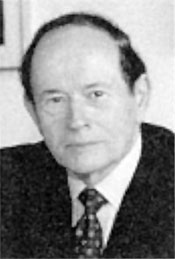
Dr. Gerald M. Edelman |
Matter Becomes Imagination
Dr. Gerald M. Edelman, who in 1972 received the Nobel Prize in Physiology or Medicine for his work on the structure and function of antibodies, will visit the campus Wednesday and Thursday, Oct. 17 and 18, as a Tercentennial Tetelman Fellow.
Edelman, who is director of The Neurosciences Institute and president of the Neurosciences Research Foundation, will be featured in three campus events.
On Wednesday, he will present the Tercentennial Tetelman Lecture on the topic "From Brain Dynamics to Consciousness: How Matter Becomes Imagination" at 5:15 p.m. in Davies Auditorium of the Becton Engineering Center, 15 Prospect St.
In this lecture, he will discuss "Neural Darwinism," a theory he formulated to explain the development and organization of higher brain functions. In an abstract for the Tetelman Lecture, Edelman said his talk "will consider what kinds of neural processes can account for key properties of conscious experience such as its unity and its diversity ... [and] will present supporting evidence on the neural correlates of consciousness obtained from MEG studies of human subjects."
On Thursday at 4 p.m., Edelman will be the guest at a tea in the Jonathan Edwards College master's house, 70 High St. The following day at 4 p.m., he will present a talk on "Synthetic Promoters and Ribosomal Filters: Uncovering New Means for Regulating Gene Expression" in Rm. 216 of the Jane Ellen Hope Building, 315 Cedar St. Tea will be served prior to the talk at 3:30 p.m.
The Neurosciences Research Foundation Edelman oversees is a publicly supported not-for-profit that is the parent to The Neurosciences Institute. In addition to his affiliations with these organizations, the neuroscientist is also a professor of the Scripps Research Institute and chair of the institute's Department of Neurobiology.
Edelman's early studies focused on the structure and diversity of antibodies. His subsequent work led to the discovery of cell adhesion molecules (CAMs), which have been found to guide the fundamental processes by which an animal achieves its shape and form, and by which nervous systems are built. His theory about higher brain functions was published in the book "Neural Darwinism" in 1987.
The Tetelman Fellowship was endowed in 1979 by Damon Wells, Class of 1958, in memory of his friend and classmate, Alan S. Tetelman, who died in an air crash in 1978. Tetelman, a metallurgist, was professor and chair of the Department of Materials at the University of California at Los Angeles.
Previous Tetelman Fellows include James Watson, Murray Gell-Mann, Justice Harry Blackmun, His Holiness the Dalai Lama, Oliver Sacks, Amartya Sen, Dr. Benjamin Carson, Harold Varmus and Sylvia T. Ceyer.
T H I S
Bulletin Home
 W E E K ' S
W E E K ' S S T O R I E S
S T O R I E S![]()
 Community Celebrates Yale's 300th Year
Community Celebrates Yale's 300th Year
![]()
![]()
 Sept. 11 attacks have put ordinary citizens on 'front line' . . .
Sept. 11 attacks have put ordinary citizens on 'front line' . . .![]()
![]()
 Economist Yellen describes 'The Art and Science of Central Banking' . . .
Economist Yellen describes 'The Art and Science of Central Banking' . . .![]()
![]()
 NIH grant supports new center for biomedical computing
NIH grant supports new center for biomedical computing![]()
![]()
 Brain expert to explain 'How Matter Becomes Imagination'
Brain expert to explain 'How Matter Becomes Imagination'![]()
![]()
 Governor of Washington to be Chubb Fellow
Governor of Washington to be Chubb Fellow![]()
![]()
 President of The New York Times to address Sept. 11
President of The New York Times to address Sept. 11![]()
![]()
 'From Biology to Ethics' is theme of Terry Lectures
'From Biology to Ethics' is theme of Terry Lectures
![]()
![]()
 'Do what's good for society at large,' urges alumnus neurosurgeon
'Do what's good for society at large,' urges alumnus neurosurgeon
![]()
![]()
 Renowned child psychiatrist Dr. Donald J. Cohen dies
Renowned child psychiatrist Dr. Donald J. Cohen dies
![]()
![]()
 Higher education, African development are talks' focus
Higher education, African development are talks' focus
![]()
![]()
 Challenges of ensuring quality care to be explored in forum on reproductive health
Challenges of ensuring quality care to be explored in forum on reproductive health
![]()
![]()
 A home of their own
A home of their own
![]()
![]()
 Yale Parents' Weekend
Yale Parents' Weekend
![]()
![]()
 Famed Westminster Cathedral Choir to make an appearance in Woolsey Hall
Famed Westminster Cathedral Choir to make an appearance in Woolsey Hall
![]()
 |
| Visiting on Campus
Visiting on Campus |
| Calendar of Events
Calendar of Events |
| In the News
In the News |
| Bulletin Board
Bulletin Board![]()
Yale Scoreboard |
| Classified Ads
Classified Ads |
| Search Archives
Search Archives |
| Deadlines
Deadlines![]()
Bulletin Staff |
| Public Affairs Home
Public Affairs Home |
| News Releases
News Releases |
| E-Mail Us
E-Mail Us |
| Yale Home Page
Yale Home Page